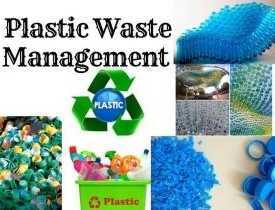Description
Course Name: Certificate in Plastic Waste Management
Course Id: CPWM/Q1001.
Eligibility: 10th Grade(High School) or Equivalent.
Duration: Two Month.
Objective: The objective of this course is to provide learners with the essential knowledge, technical skills, and strategic insights needed to manage plastic waste sustainably. The course focuses on the collection, segregation, recycling, and upcycling of plastic waste, along with environmental regulations and business development opportunities, enabling participants to contribute to the circular economy and reduce environmental pollution.






Debit/Credit Card, Wallet, Paytm, Net Banking, UPI, or Google Pay.



• A soft copy (scanned) of your certificate via email within 7 days of examination.
• A hard copy (original with official seal and signature) sent to your address within 45 day of declaration of result.

Online Examination Detail:
Duration- 60 minutes.
No. of Questions- 30. (Multiple Choice Questions).
Maximum Marks- 100, Passing Marks- 40%.
There is no negative marking in this module.







Syllabus
Introduction to Plastic and Waste Management: History and evolution of plastic, Types of plastics and their uses, Environmental impact of plastic waste, Sources of plastic waste, Plastic waste in urban and rural areas, Global statistics on plastic pollution, Importance of plastic waste management, 3Rs concept (Reduce, Reuse, Recycle), Legal and policy framework in India, Career opportunities in plastic waste management.
Classification and Identification of Plastics: Thermoplastics vs thermosets, Common plastic types (PET, HDPE, LDPE, PVC, PP, PS), Resin Identification Codes (RIC), Physical and chemical properties of plastics, Plastic usage in various industries, Toxic and non-toxic plastics, Biodegradable vs non-biodegradable plastics, Plastic waste sorting techniques, Importance of correct classification, Challenges in plastic identification.
Collection and Segregation of Plastic Waste: Plastic waste collection systems, Role of municipalities and private sectors, Door-to-door collection process, Community-level collection models, Manual vs automated segregation, Source segregation importance, Tools and equipment for collection, Color-coded bin system, Challenges in segregation, Best practices in waste collection.
Recycling and Recovery Techniques: Mechanical recycling process, Chemical recycling overview, Energy recovery from plastic waste, Steps in plastic reprocessing, Washing, shredding, and pelletizing, Equipment used in recycling, Quality control in recycled plastics, Limitations and challenges in recycling, Reuse of recycled plastic products, Innovations in plastic recycling.
Plastic Waste Treatment Technologies: Incineration and pyrolysis, Gasification of plastic waste, Co-processing in cement kilns, Compostable plastic treatment, Landfilling of residual plastic waste, Environmental impact of different methods, Comparison of treatment techniques, Plastic to fuel conversion methods, Pilot and industrial-scale units, Techno-economic analysis.
Environmental and Health Impacts: Microplastics and marine pollution, Air and soil contamination due to plastic waste, Plastic waste and climate change, Human health risks from plastic exposure, Impact on wildlife and biodiversity, Groundwater and land degradation, Occupational health hazards in recycling units, Environmental monitoring techniques, Case studies on pollution hotspots, Public awareness and behavior change.
After successful completion of the Certificate in Plastic Waste Management program, graduates are equipped with practical knowledge and technical skills in collection, segregation, recycling, and disposal of plastic waste. In India, plastic waste management is a growing sector due to increasing environmental awareness, regulatory policies (like the Plastic Waste Management Rules), and demand for recycled plastic materials.
✅ Career Options After Certificate in Plastic Waste Management – India
| Job Role | Job Description | Average Salary Range (per annum) |
|---|---|---|
| Plastic Waste Collection Supervisor | Manages and monitors waste collection from households, industries, and public areas. | ₹2.0 – ₹3.5 LPA |
| Recycling Plant Operator | Operates shredders, extruders, and washing units used in plastic recycling processes. | ₹2.2 – ₹4.0 LPA |
| Waste Segregation Technician | Segregates plastic waste based on type (PET, HDPE, LDPE, etc.) for effective recycling. | ₹1.8 – ₹3.2 LPA |
| Quality Control Analyst (Recycled Plastic) | Tests recycled plastic for purity, strength, and usability. | ₹2.5 – ₹4.5 LPA |
| Environmental Compliance Officer | Ensures operations comply with local and national pollution control norms and EPR policies. | ₹3.5 – ₹6.5 LPA |
| Sales & Marketing Executive – Recycled Products | Promotes and sells recycled plastic materials to manufacturers and B2B clients. | ₹2.5 – ₹5.5 LPA + incentives |
| Entrepreneur – Plastic Recycling Unit Owner | Starts a plastic recycling or reprocessing unit, converting waste to granules or products. | ₹6 – ₹25+ LPA (profit-dependent) |
| Sustainability Officer | Works with corporates or NGOs to manage plastic waste disposal and sustainability programs. | ₹4.0 – ₹7.0 LPA |
♻️ Key Industry Sectors
-
Plastic recycling and processing plants
-
Municipal corporations and waste management agencies
-
NGOs working on environmental sustainability
-
Plastic product manufacturers
-
EPR (Extended Producer Responsibility) service providers
-
Startups in circular economy and green innovation
📈 Career Growth Path
-
Technician → Supervisor → Operations Manager
-
QC Analyst → QA Head → Technical Consultant
-
Sales Executive → Business Development Manager
-
Entrepreneur → Manufacturer → Exporter of recycled products
💼 Entrepreneurial Opportunities
Graduates can:
-
Start a plastic collection and sorting business
-
Set up a plastic recycling plant (granules, flakes, sheets)
-
Manufacture eco-friendly plastic alternatives or recycled products
-
Work with local bodies for urban waste collection and processing
💰 Earnings Potential for Entrepreneurs:
-
Small unit: ₹30,000 – ₹1 lakh/month profit
-
Medium/large unit: ₹10 – ₹30+ LPA depending on capacity and contracts

